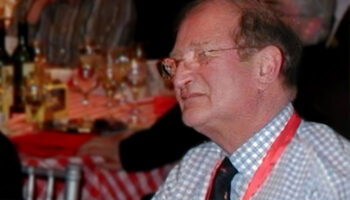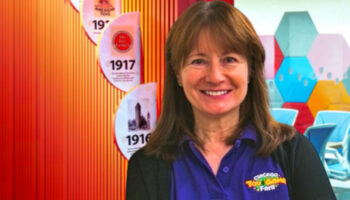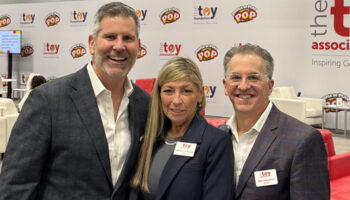I.D.I.O.T. Award Winner Ben Rathbone discusses his lifetime in games and much, much more…

Ben, it’s taken a while to get our diaries to align… But here we are – thank you for making time!
Pleasure!
So… Yours is a friendly, familiar and seemingly omnipresent face in the industry. How did you come to be in toys and games?
I used to work at the very first Games Workshop which was around the corner from my school in Hammersmith, London. I also used to hang out there, playing games. Just through that, I got to know a gentleman called Stephen Baker, whom you may have heard of…
Oh, yes… And I’ll just say that if people want to know why that’s a legendary name, they can read an interview with Stephen Baker here. For now, you would say people best know him as…
Oh, the inventor of Hero Quest! In those days, though – for a while – he was the manager of Games Workshop. So I knew him from playing games. And then we had a gentleman called Roger Ford, sadly no longer with us. He’s the father of Max Ford… Roger ran Milton Bradley in the UK at the time. He came in and started chatting, then he asked if we’d to like to come and test some games for him. Stephen went along too; he then basically got a job there.
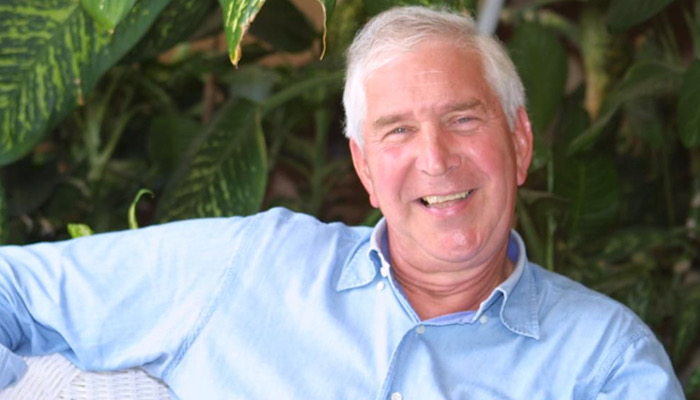
Stephen went to Milton Bradley?
Right. Meanwhile, I went to university down in Brighton on the south coast. But then – between my second and third year – Stephen asked if I wanted to come and do some summer work there; testing and refining his new game, Hero Quest. So I did some work on that. And it happens that they were based in Richmond, Greater London… Which is my hometown!
No?!
Yes! They were round the corner! So that was great. After I finished, I went back down to Brighton, but I was keeping in touch. And for whatever reason, they mentioned they’d got an assistant designer position available and asked if I wanted to join them. It was one of those time and place things.
Yes, but you’re being a little modest. You were also the right person! So you more or less went from university straight into the industry… This is your whole life! And for context, when was this, Ben? What was the year?
It’s 34 years ago; 1989. And Stephen and I both ended up in the States. He lives two hours that way!
So straight out of uni, into the industry; 34 years – and still going strong. Let me ask you this: if you didn’t do that, if you weren’t in toys and games, what do you think you would be doing?
Well, originally I was looking to get into publishing. That’s what I was originally, looking to do because I did English and history at Brighton University. And publishing is what I was investigating. But it’s one of these things… I never really thought there were people who professionally worked on the design of games.

But games were on your radar, obviously… You played them as a child?
Oh, yes; we always played games as a family… I’ve got two older brothers. One of them got a copy of Dungeons & Dragons way back when it first came out – our friend’s father traveled to the US a lot and brought an early copy back with him. So we played that. But once Roger Ford mentioned designing games, I just thought: ‘that’s kind of interesting’.
Not to interrupt you, Ben, but Roger Ford and Max Ford are both I.D.I.O.T. winners, of course… And I want to mention that Max did a lovely interview about their awards. People can read that here. Apologies! You also mentioned role-playing games there, and that interests me because a lot of inventor relations folk at mass market companies don’t have a great interest in that. Not a criticism – they just focus more on other types of game. What kind of games do you personally prefer?
That’s a great question! I have a scarily large collection of games. And since I live in the US, I have a giant basement where I can store them! Which is not a good thing because it just encourages me…
Ha!
These days, though, I’ve got to the point where I just can’t be doing with deep-strategy games anymore. I just haven’t got the time for them. So I currently prefer to play games that are low- to mid-level strategy. Things that you can play over two hours and repeat. I also like card games. I’m kind-of fascinated by all the classic card games and what you can do with them. Look at Rummy… Rummy’s done all sorts of things with it. Mystery Rummy’s a great example. But then, I also like just pulling out new things and trying those!
Time permitting…
Time permitting! In fact, one sad thing about Gen Con this year was – because we were demoing on the stand the whole time – we didn’t really get time to go out and play stuff. But at home, we still have our family favourites. Monopoly Deal just came to mind! Monopoly Deal, by the way, is the thing I’m most proud of in all my time at Hasbro.

Is that right? And you did a lot of games at Hasbro…
Right. But Monopoly Deal is the one that’s really stayed. Still sells, still going… And it took a while to develop – but people just love it. I always have one in my bag. As a family, we always travel with it. It can play equally well with two players or five.
In my head, Monopoly Deal has also got Richard Heayes’s fingerprints on it… Was that an inventor item?
No, it was in-house; but you’re right – Richard was part of the Hasbro games design team who worked on that. The design was mainly led by an excellent designer who is no longer in the industry: Katharine Chapman. And then it was me, Scott Dean, Richard Heayes…
Ah! Makes sense! I have it on good authority that – of the ten best-selling Monopoly products over the last 15 years – Scott Dean, Richard Heayes and Amanda Birkinshaw collectively designed eight of them… That’s something that came up in an interview; I’ll link to it here. In any case, what is it about Monopoly Deal that’s compelling? What’s the X factor there?
It’s really about the fact that you can come back from behind very easily! You can be doing really badly, then – 10 minutes later – you’ve destroyed everyone and taken everything. Ha! So yes, it’s got that great up and down… That makes it a little unpredictable; you don’t know what’s gonna happen. I love that about it.
Great answer! And that speaks to your very broad taste, I think. So you’re happy to find something cool anywhere on the spectrum…
Yes, and I still do! I still see stuff come to the table that I’ve never seen before. You know, when people ask about game design, I often use cooking as an analogy. Everyone basically has the same ingredients, but there’s so many different ways you can put this stuff together, mix it serve it up and garnish it. That’s what I really find fascinating… How people can just take one idea, put it together, or take one idea and spin it in a whole different way. And that’s what keeps the industry going, and keeps it fresh.

Out of interest then, is there one type of game about which you feel less enthusiastic?
I think the only thing that I am less enthusiastic about these days is the abundance of party games that have got one rule and 200 cards that play to that rule! They often depend on a clever name and engaging card copy.
Ha! Plenty of those about!
There’s plenty of them about, and they do very well. Those are the games, though, that I feel are offering something that’s easy to get into, but there is a constant stream of them.
I always wonder if that’s just attention-span related… Because that kind of game is instantaneously accessible. It’s like fast food: it’s easy to buy; easy to consume… But because the experience is quick and disposable, you don’t necessarily find it that satisfying.
Yes, that’s why it’s so popular. That’s why it does so well! I’m not saying it’s wrong. I totally understand why they’re successful.
In terms of your role at Buffalo, Ben, I guess you’ve been there for two years now?
A little over two, yes. I started near the end of May 2022.
That’s right then. So, in your current role, what do you look for in an idea at Buffalo that perhaps would be useful for inventors to know?
Well, as you know, the great thing is – first of all – we have three brands. We’ve got Buffalo Games, Gamewright Games, and Brainwright Games. One of the interesting things was pulling that together as one games team, and then laying that out in terms of what we want to see. Buffalo Games are more trend based. That tends to be where we have our party games, licensed games, dexterity games and more of our core modern-family games. We also run our light strategy games there.

Gamewright offers our cross-generational family games. It also allows us to do some fun, quirky little games… Some for core families, some for younger kids, but with rules that have a tiny, steep learning curve. And they’ve got a lot of great games in the catalogue already from Sushi Go to Abandon All Artichokes, even things like Dragonwood and Dragon Realm. They have great little mechanisms in the centre, but are easy to demo and take people through. We do some kids and party games there, but not many… Slamwich, Rat-A-Tat Cat… Both of those have been going for 30 years.
Wow. And Brainwright?
Brainwright has more of the puzzle games, fidget stuff. Very different from the rest of it. So it’s a nicely separated portfolio that we manage together as one team. But another thing I should say about what we have been building is that – a lot of the time – we’ll come up with an initial idea, then go out to separate inventors and say, “Hey, we kind of had this thought. Do you want to work on it with us?”
So you have the germ of an idea? But you’ll contact inventors to germinate them; to grow them?
Exactly. Because we do have a lot of internal ideas, but we don’t have a vast team to do them all. We’ll say, “What about this?” or “This could be that…” You know? Some of them are literally just a name… So then we’ll think about who would be good to work on it… Who’s good with card games? Or card games with dice, say. And we’ll reach out and say, “Hey, do you want to collaborate on something with us?” We’ve got about four games in the 2024 line that have come from that.
Love it! And do you still invent yourself, Ben?
Actually, it’s funny you should ask… Have you met or talked with Erica Bouyouris?
Yes, I interviewed Erica a while ago. Interesting stuff – I’ll put a link into her interview here. Well – presuming you’re about to say something positive!
Ha! Yes, it’s positive! Erica’s an inventor based in Canada, but – when I was at Spin – I hired her to be our gameplay person. We worked very closely. She kind of put me back on to building games and doing them myself. So I’ve built two totally new games since I’ve been at Buffalo, because Erica’s process is great.
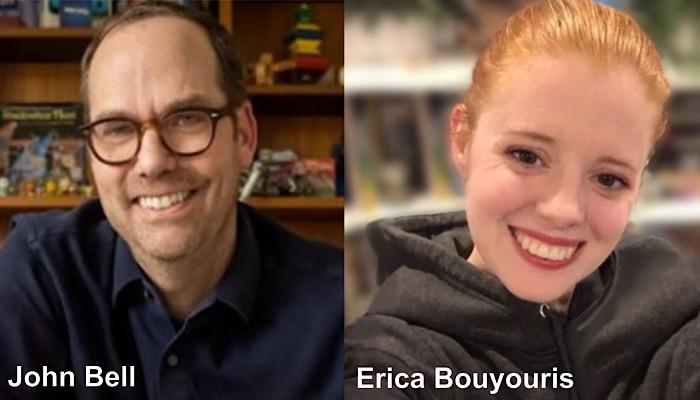
And they’re finished?
One is mostly complete. The other I’ve got to finish… But I got back into that hands-on creative process and having to think through the card creation and the mechanics and the balancing. That part is something I hadn’t done for a long time – so it was good to get back into that.
I can imagine, actually. It’s always an interesting feeling to come back to certain types of creativity. Speaking of which, something I wanted to come back to was how inventors structure the pitch when they show you ideas. Do you prefer them to do that in a particular way?
No, I don’t; not really. I mean, I do always prefer face-to-face meetings – whether it’s over Zoom or in person – because it gives you the chance to chat. It also gives you a chance to ask questions and just think about stuff. So I think that’s the most effective way, and if I don’t quite get something, I can ask, “Why do you do this?”; “What’s the reason for that?” Also, in that sort of conversation – if I see something, but it’s not for me – I can give some meaningful feedback. Because I want to make sure the inventor has some good feedback and maybe something they can use to improve that game, even if they’re taking it somewhere else.
You’ll give advice even if the idea’s not for you?
Right. Because I’ve got a fair bit of experience, and I want to help inventors with some of that thinking if I can… Just in terms of how they can perhaps improve an idea or think about a game in a different way. Even if it’s not for Buffalo.
Excellent. But other than being face-to-face, you don’t have a particular structure? No strong views on sale sheets? Or sizzles?
No! The way I see it is that everyone’s got their own style. Everyone does it in a way that suits them. And I can look at it in any way! I’d rather everyone just feels comfortable. I don’t need to see a video… As long as the idea comes across clearly. And if it doesn’t, by doing it face-to-face with someone who needs a bit of guidance, I can ask questions and then direct if need be.

Great answer… It’s quite unusual to have someone say, “Relax; do what you like.”
Well, here’s the thing: I usually pick up on ideas pretty quickly. I’ve seen enough stuff to know what things are; I kind of know where things are going. Although I’ll occasionally think, “Whoa, I didn’t see that coming!” Those pitches are often the fun ones. But, for the most part, I think I can see a sell sheet and know what kind of a game it is. And there are some inventors, professionals, who suggest that – if I don’t like what they’re saying halfway through, I should just tell them. And I’ll do that.
Wow. No wonder people rate you so highly, Ben. You’re like a gift to inventors with that laid back approach!
To me it’s a creative chat. I enjoy it. And the game industry is a small one, so it doesn’t make any sense to just limit people or shut them down. Because we really want to encourage inventors and make them better. Honestly, if you can give some pointers to a new inventor so they can think in a different way, then – hopefully – they’ll come back with an even better product.
Brilliant. We’ll need to start wrapping this up quite soon because I know how busy you are, but I wanted to talk about your I.D.I.O.T. Award, Ben. So now… What would you say if I were to ask why you think you were singled out for that?
Well… For a start, I was truly surprised; completely taken aback. And you know, it was one of these things where I was chatting away and could hear in the background a little about who the winner is, what they’d done… And it was Roger Ford doing this intro: he’d originally hired me at Hasbro. But I didn’t put it together right away. As to why – who knows?
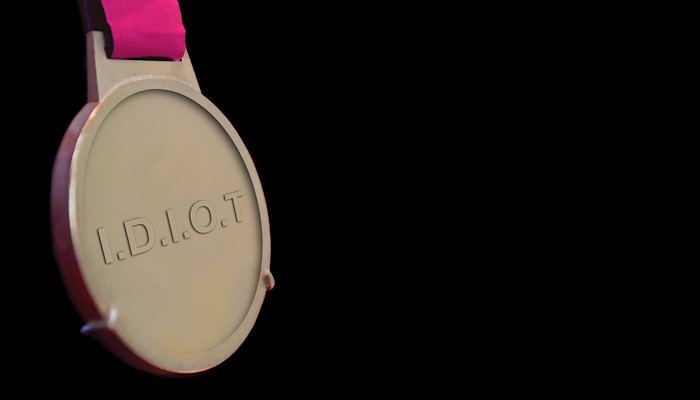
I don’t remember the timing of things, but I think I’d been in inventor relations for a while by the time of the award. Maybe I was new enough or young enough at a time when inventor relations was on a cusp; moving from old school to new school. I think, if I looked at it, it’s as though we’d had the old school with some of the greats – Phil Orbanes and Mike Myers and David Fear – the latter both previous winners. They’d all been been driving the industry… But maybe I was one of the younger ones coming through. I don’t know if or why I’d made an impression, or if I was seen as making waves… I don’t know!
It intrigues me too – because this is quite common – that people are sitting at that dinner and there’s a sort of quiet babble because you’re supposed to be listening to the talk – but you’re also trying to finish up a conversation with an old friend, so you’re not paying full attention. But at some point during the speech, you realise they’re actually talking about you! At what point did you say to yourself, “Hang on a second… Is it me?!”
Oh, it was very close to the end! I couldn’t believe it.
They said your name, basically!
Ha! But you know one of my big regrets to this day is that, because I was so shocked, I really didn’t thank the people I should’ve thanked – because I was just so stunned. I mean… Wow. One minute I’m sitting there chatting. The next I’m up there and I’m too stunned, you know?
I can well imagine! You were so stunned you literally didn’t thank anyone on the night?
No, I literally went up there and I was, “Oh yeah, thank you!”… But I regret not being able to thank specific people.
Whom would you have thanked?
I would’ve thanked Roger Ford, Stephen Baker, Mike Gray, and David Fear who was basically my boss at the time. He’d more or less taken me round and introduced me to people and showed me the ropes on inventor relations. Great people.
Brilliant. Well, there we are, Ben… Let’s end with those overdue thank yous! If nothing else, it feels like we’ve put that on the record and righted an understandable wrong! Thanks, Ben.
–
To stay in the loop with the latest news, interviews and features from the world of toy and game design, sign up to our weekly newsletter here








